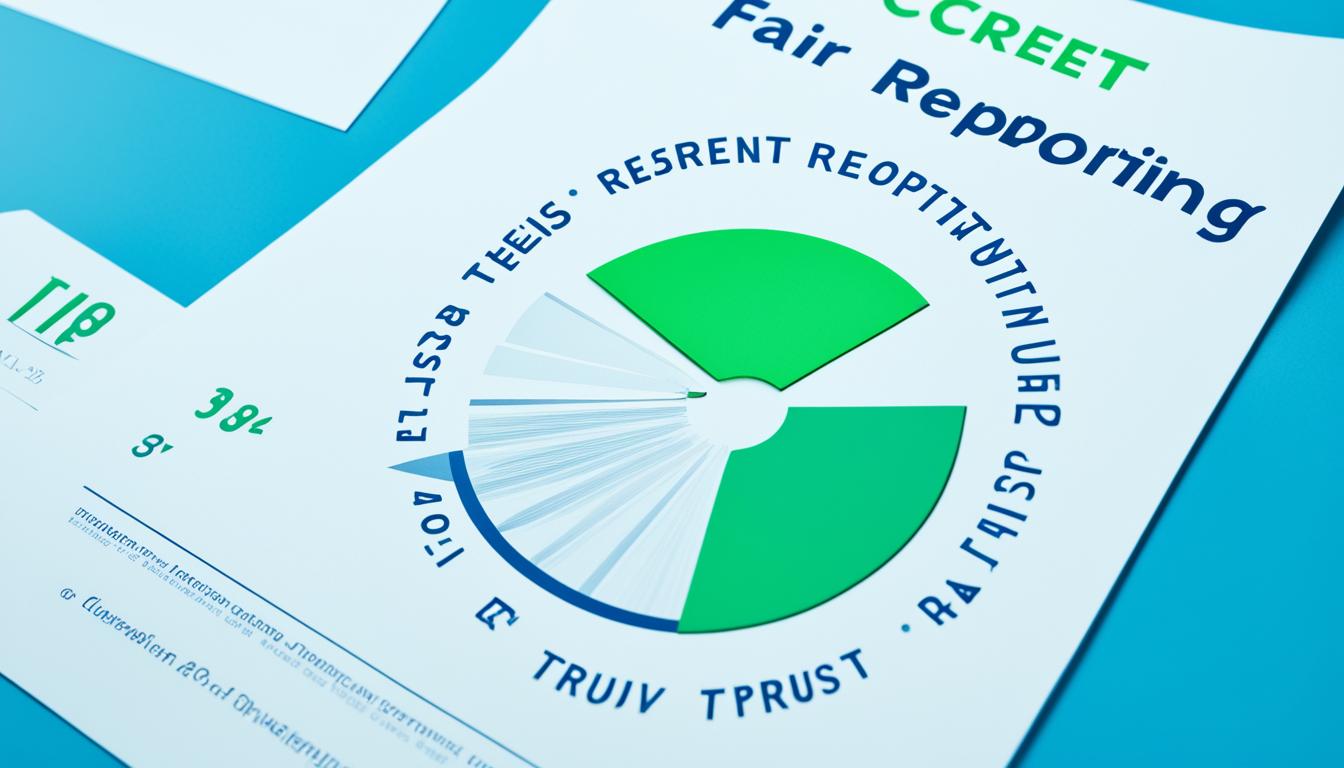Violation of Fair Credit Reporting Act knowing your rights regarding fair credit reporting
The Fair Credit Reporting Act (FCRA) is a law that protects consumers. It regulates how credit information is collected and shared. It’s crucial to know your rights under the FCRA to protect your credit score. This includes dealing with credit report errors or inaccurate information.
This article will give you an overview of the FCRA. It will also guide you on how to protect your credit score and fix any mistakes.
Key Takeaways:
- Know your rights: Familiarize yourself with the Fair Credit Reporting Act for protection.
- Monitor your credit: Regularly check your credit reports for errors or inaccuracies.
- Dispute inaccuracies: Take immediate action to correct any credit report errors.
- Understand credit bureaus: Learn about the major credit bureaus and their role in reporting credit information.
- Seek remedies: If your rights are violated, you have legal remedies available.
What is the Fair Credit Reporting Act?
The Fair Credit Reporting Act (FCRA) is a federal law. It protects consumers’ rights with credit reporting agencies. These agencies keep accurate and fair credit reports. They collect info on consumers’ financial activities, like credit accounts and debt history.
Consumers have the right to see their credit reports, dispute wrong info, and get alerts on credit report actions. Actions like denying credit or a job can be based on these reports.
The FCRA aims to make credit reporting fair, accurate, and private. It gives consumers tools to manage their credit and protect their reputation. It sets rules for credit agencies, creditors, and others handling credit info.
Under the Fair Credit Reporting Act, credit agencies must:
- Keep accurate info in consumer reports.
- Give consumers free credit reports yearly.
- Fix wrong info in reports when told by consumers.
- Get consumer okay before sharing credit info with others.
- Tell consumers when negative info is added to reports.
The FCRA covers credit agencies and those sharing consumer credit info. It sets rules for handling disputes and reporting to consumers. Breaking these rules can lead to legal trouble for agencies and others.
If you want to learn more about the Fair Credit Reporting Act and your rights, visit this resource.
Common Violations of the Fair Credit Reporting Act
Violations of the Fair Credit Reporting Act (FCRA) can seriously affect consumers. Knowing about these violations helps people protect their rights. Here are some common ones:
- Fair credit reporting act violations: Companies breaking FCRA rules can harm consumers. This includes wrong credit info, errors on credit reports, and wrong use of credit reports.
- Credit report errors: Wrong info on credit reports can lower credit scores. Common errors are outdated or wrong personal details, wrong account balances, and accounts not belonging to the consumer.
- Inaccurate credit information: Wrong or old info from creditors can lead to wrong credit reports. This can make it hard to get loans, get good interest rates, or even find a job.
Other FCRA violations include:
- Mixed credit files
- Identity theft
- Not giving required disclosures
These violations can really hurt people’s financial goals and cause a lot of stress. It’s important to know about these and act if needed to protect your financial future.
Learning about these violations and your rights under the FCRA helps you stay safe from unfair practices. It also keeps your credit info accurate. Next, we’ll talk more about your rights under the Fair Credit Reporting Act.
Your Rights under the Fair Credit Reporting Act
It’s crucial to know your rights under the Fair Credit Reporting Act (FCRA). These rights let you manage your credit info and guard against wrong reporting or identity theft.
1. Access to Free Annual Credit Report
You can ask for a free copy of your credit report from the three big credit bureaus (Equifax, Experian, and TransUnion) every 12 months. This helps you check your credit info, spot mistakes, and fix them fast.
2. Dispute Inaccurate Information
If you find wrong or missing info on your credit report, you can dispute it. The FCRA says credit agencies must check your dispute in 30 days and remove wrong info. This keeps your credit report correct and your credit history honest.
3. Corrections to Errors
If you win your dispute, you can ask for corrections. The agency must update the info and give you a new credit report. Make sure to check the new report to see if the changes were done right.
“Understanding and exercising your rights under the Fair Credit Reporting Act is crucial in protecting your credit score and ensuring the accuracy of your credit information.” – Lexi Thompson, Financial Advisor
4. Fraud Alert and Credit Freeze
If you think your identity has been stolen or there’s fraud, you can put a fraud alert or credit freeze on your report. A fraud alert warns lenders to be extra careful with your credit applications. A credit freeze blocks access to your report. These steps protect your credit and stop others from opening accounts in your name.
5. Seek Legal Remedies
If your FCRA rights are broken, you can take legal action. You might get money damages for any harm done. Talking to a lawyer who knows consumer protection can guide you through your legal options.
Knowing and using your rights under the Fair Credit Reporting Act helps protect your credit, fix mistakes, and keep your credit score healthy. Always check your credit reports often to make sure everything is correct.
Remedies for Violations of the Fair Credit Reporting Act
If you think your rights under the Fair Credit Reporting Act (FCRA) have been broken, you have ways to fight back. Knowing these options is key to protecting your rights and getting fair treatment in credit reporting.
1. Damages for FCRA Violations
One way to fix FCRA violations is by getting damages. If a violation hurt your wallet, you might get money back. This could be for any costs or losses you faced, like higher interest rates or missed chances.
2. Credit Score Impact
FCRA violations can also hurt your credit score. Wrong info on your report can lower your score, making loans harder to get and interest rates higher. The FCRA can help by fixing wrong info and telling everyone who saw it.
3. Punitive Damages
If a FCRA violation was done on purpose or was careless, you might get punitive damages. These are meant to punish and stop others from doing it again. This extra money makes credit agencies and others think twice before breaking the law.
4. Attorney’s Fees
You might also get back money for lawyer costs when fighting FCRA violations. This helps people who were wronged get legal help without spending a lot of money. It makes it fair to fight for your rights against FCRA violators.
5. Injunctive Relief
Injunctive relief is another way to fix FCRA problems. It means asking a court to make the credit agency or others do certain things, like fix wrong info or stop bad practices. This kind of relief stops more harm and makes reporting better in the future.
Talking to a lawyer who knows about FCRA violations is a smart move if you think you’ve been wronged. They can give you advice, check your case, and help you get the right remedies under the Fair Credit Reporting Act.
Steps to Take in Case of a Fair Credit Reporting Act Violation
If you think your rights under the Fair Credit Reporting Act have been broken, act fast to protect yourself. Here are the steps you should follow:
- Request a copy of your credit report: First, get a copy of your credit report from a major credit reporting agency. This shows your credit history and any mistakes or wrong info.
- Review your credit report: Look over your credit report for any mistakes, like wrong personal info, accounts you didn’t open, or wrong payment history. Note these errors and collect any proof you have.
- Dispute the incorrect information: Then, talk to the credit reporting agency about the mistakes you found. Write a formal dispute letter with the details of the errors and any documents that prove it. Keep all your letters.
- Follow up regularly: Keep following up with the credit reporting agency as you dispute the errors. Remember the dates, times, and names of the people you talk to, and any promises they make to fix the issue.
- Seek legal assistance if necessary: If the agency doesn’t fix the problem or keeps violating your rights, think about getting a lawyer. A lawyer who knows about consumer rights can help you with the legal steps and protect your interests.
Remember, fixing a credit report mistake can be hard, but it’s key to standing up for your rights under the Fair Credit Reporting Act. By following these steps, you can fix any errors or violations and make sure your credit history is correct.
Conclusion
It’s key to know your rights under the Fair Credit Reporting Act for a good credit score and accurate credit info. Learning about the FCRA helps you manage your financial reputation and guard against wrongdoings.
With this knowledge, you can challenge wrong info on your credit report. You can also ask for outdated or negative items to be removed. Plus, you can get a free credit report every year. These steps are vital for keeping your credit good and getting credit or loans easily.
If the FCRA is broken, act fast. Tell the credit agencies and the wrongdoer about any mistakes. Also, think about getting help from a pro to fix your credit right.
Always check your credit reports for mistakes or fraud. Fixing these issues is important. By using your rights under the Fair Credit Reporting Act, you can keep your finances safe and make sure your credit info is correct.



